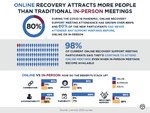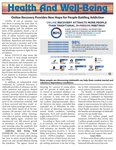

(NAPSI)—If you or someone you care about is among the more than 42 million Americans battling addiction and struggling with the isolation and stress of the pandemic, there’s a ray of hope and a positive path forward in the form of online recovery and support programs. Among increased feelings of loneliness, depression and anxiety, therapy has become a necessity, and in the midst of COVID-19, the recovery community has pivoted to online meetings and teletherapy sessions to fight the war of isolation.
Before COVID-19 shut down life as we knew it, most people associated addiction recovery with meetings in church basements and community centers or 30-day stays in treatment centers. In fact, online recovery treatment and support has been around for more than 10 years and has proven as effective, if not superior to in-person treatment, according to the Department of Veterans Affairs.
In addition, an independent study conducted by Lionrock Recovery, a telehealth provider of substance use disorder treatment and support, showed that 80 percent of people in their online recovery meetings since the pandemic started, had never attended any support meetings—either online or in person - prior to the coronavirus outbreak. Half of those surveyed said they would attend only online meetings when restrictions were lifted. Nearly all of the participants (98 percent) said they would continue to attend online meetings, even when in person meetings become a viable option again. Lionrock has experienced over 400 percent growth in attendance of online recovery support meetings since the pandemic first caused national shutdowns in March.
Addiction Risk Rising With COVID-19: The Center for Disease Control (CDC) surveyed adults during late June to assess mental health, substance use, and suicidal ideation during the pandemic. The agency found an alarming 24.7 percent of young adults and 19.5 percent of adults ages 25 to 44 started or increased substance use to cope with pandemic-related stress or emotions in June, with the Black and Hispanic populations and essential workers disproportionately affected. However, the report concluded that expanded use of telehealth, an effective means of delivering treatment for mental health conditions, including depression, SUD, and suicidal ideation, might reduce COVID-19-related mental health consequences.
According to Peter Loeb, co-founder of Lionrock, one of the reasons telehealth is so effective in treating people with substance use disorder and supporting long-term recovery, is its flexibility and privacy. People can seek and receive HIPAA-compliant treatment from the privacy of their home, any time of day. To-date, a major barrier for people seeking treatment is the fear of stigma in their communities; online treatment’s privacy eliminates that concern.
The benefits of telehealth inspired Loeb to create National Online Recovery Day, which is celebrated on September 22, as part of National Recovery Month. National Online Recovery Day is a campaign to raise awareness for online treatment of substance abuse. It is the first national health awareness day focused on the benefits and advantages of telehealth services for any health issue.
While 42.2 million people need treatment, SAMHSA data reveals only 4 million people actually receive it. The COVID-19 pandemic threatens to create an epidemic from substance abuse, but by improving awareness of, and access to, online care, more Americans can receive the care and support they need.
Learn More
To learn more about online recovery for substance use disorders visit www.NationalOnlineRecoveryDay.com.